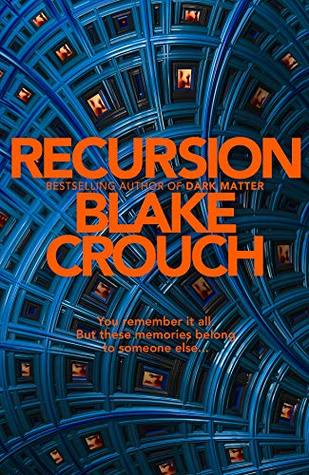This review includes spoilers, you've been forewarned.
Decent sci-fi read, not terribly challenging, perhaps a bit overly grim towards the end, but entertaining all round.
Decent sci-fi read, not terribly challenging, perhaps a bit overly grim towards the end, but entertaining all round.
After reading The Three Body Problem, I feel like sci-fi might be spoilt for me if it's not rooted deeply in hard science! Though Recursion does stem from a real world MIT experiment (amazingly) it's more akin to the romantic notion of sci-fi (if that's even a thing!).
The book splits pretty cleanly into three phases: 1. setup and drama, 2. sci-fi, time travel, action, 3. world ending disaster and reconciliation.
I felt like the first part was a little underwhelming, wondering where the story was going and what these two characters had to do with each other: Helena and Barry.
Thankfully this is cleanly answered in the second part where some interesting ideas are at play: specifically being able to travel back to a memory and "fork" reality off into a new timeline. Though it's only mentioned briefly, it feels like this a nod to four dimensions.
The last part when the characters decide they have to save the world - though apparently it's just down to one person not only being responsible for the end of the world but also be responsible for stopping it.
The book does its best to tell some fairly horrific tales of how the world would end - though this is very American-centric, but as the characters are based in the states, I'd imagine this is because it's their point of view. The descriptions of skin melting off and sores and blisters and radiation burning and all of that is fairly graphic. I can't decide if it made this part of the story more harrowing or if it just felt grotesque.
There's also large chunks of scenes where the protagonists are such incredible pain (the skin from a handprint peeling off and sticking to the walls) that I wondered how they were supposed to actually perform anything, instead of passing out from internal failure. But still, it's just a story!
Overall, a decent read, not super challenging and explored some "fun" ideas with time travel and the concepts of what reality might be.
7 Highlight(s)
Life is nothing how he expected it would be when he was young and living under the delusion that things could be controlled. Nothing can be controlled. Only endured.
She has never managed to achieve escape velocity from the irresistible gravity of her work
and finally a print over the bed of Van Gogh's The Starry Night,
Nancy was Dorothy's older sister. She died in childbirth more than forty years ago, before Helena was born.
and like many names that start as a bad joke without a quick replacement, the name sticks.
She realizes that children are always too young and self-absorbed to really see their parents in the prime of their lives.
Could the fate of reality itself really depend upon one person not getting randomly hit by a bus?
